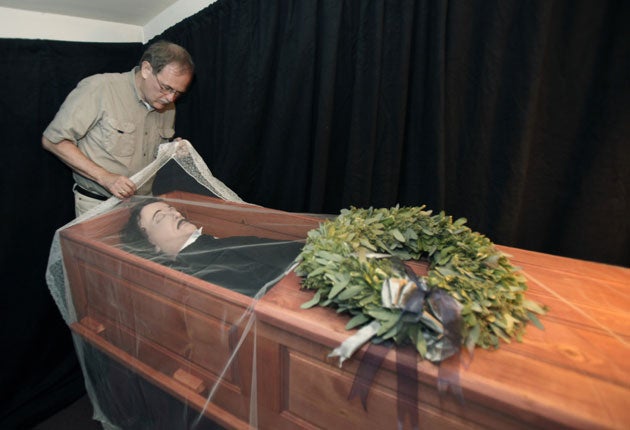Edgar Allan Poe given funeral 160 years after his mysterious death
American master of the horror story is finally told to rest in peace

Your support helps us to tell the story
From reproductive rights to climate change to Big Tech, The Independent is on the ground when the story is developing. Whether it's investigating the financials of Elon Musk's pro-Trump PAC or producing our latest documentary, 'The A Word', which shines a light on the American women fighting for reproductive rights, we know how important it is to parse out the facts from the messaging.
At such a critical moment in US history, we need reporters on the ground. Your donation allows us to keep sending journalists to speak to both sides of the story.
The Independent is trusted by Americans across the entire political spectrum. And unlike many other quality news outlets, we choose not to lock Americans out of our reporting and analysis with paywalls. We believe quality journalism should be available to everyone, paid for by those who can afford it.
Your support makes all the difference.Edgar Allan Poe, master of the macabre, was finally given a funeral befitting his legacy as one of the great writers of Gothic fiction yesterday, 160 years after his mysterious death.
Passersby gathered to witness some of the greatest names in the arts pay their respects to one of their own: Sir Arthur Conan Doyle, 69 years deceased, was there, along with Sir Alfred Hitchcock, who passed away in 1980, and hundreds more acted as pallbearers and mourners as a replica of Poe's body was pulled through the streets of the city of Baltimore, which is claiming him. The aim of the event was to rectify an injustice.
Poe died on 7 October, 1849, at just 40, a few days after being found outside a bar in Baltimore, delirious, penniless and unable to explain to anybody what was wrong with him. His first funeral was never announced, so just 10 people turned up to witness the burial of the great writer of The Raven and The Pit and the Pendulum, feted in his lifetime as a fearless literary critic and recognised by history as the pioneer of detective fiction.
The services, planned at Westminster Hall near the Westminster Burial Grounds, were to include eulogies offered by actors portraying other famed writers. Hundreds of people have already visited the casket containing a mannequin of Poe, before it was taken by horse-drawn carriage for the 19th-century-style funeral. The event proved so popular that organisers put on a second event after an all-night vigil at his graveside.
Jeff Jerome, who curates the Poe House and Museum in Baltimore, told local reporters that the writer has been sorely misunderstood. "We say that guy must have been one strange dude when, in effect, he was writing these stories not for himself but for you and I," he said. "He tried the science fiction. But people wanted blood, they wanted horror, they wanted premature burial. They wanted superstition. They wanted murder. And he gave it to them, right between the eyes."
Whatever his gifts, Poe never made much money from his creative writing in his lifetime, as the mystery of his death and the modesty of his original funeral reveals. The cause of his death have the hallmarks of a Gothic mystery left unfinished: fans and historians have debated between cholera, rabies or syphilis and alcoholism. Contemporary newspaper reports cited "congestion of the brain", but all medical records have been lost. The author is said to have repeatedly called out the name "Reynolds" on the night before his death. Like much about Poe's life, exactly who he was referring to remains a mystery that not even Sir Arthur and Sir Alfred could explain.
Join our commenting forum
Join thought-provoking conversations, follow other Independent readers and see their replies
Comments